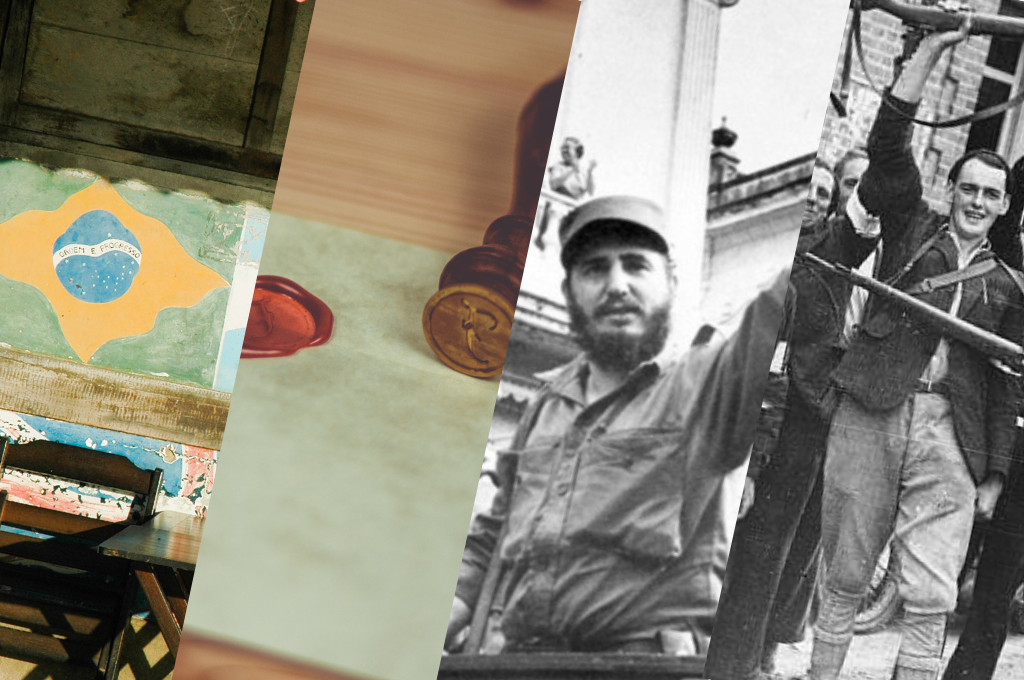Kurzy visiting profesorů

Tak jako každý semestr i v tom letním nabízí UHK hned několik předmětů vyučovaných zahraničními odborníky. Podívej se na naši nabídku a vyber si ten svůj!
Comparative Politics in Latin America
Seals in the Middle Ages and early modem times with special reference to Silesia region Lenght.
Century of the irregular: Revolutions and Civil Wars in the 20th century
Resistance and collaboration in Hitler's Europe
Nebo si nevěříš na předmět v angličtině? Nevadí! Zapiš si konverzaci v angličtině s rodilým mluvčím, získej 3 kredity a zlepši si jazyk!
Comparative Politics in Latin America
 KP/CPLA 5 Kreditů
KP/CPLA 5 Kreditů
This course starts with the principal concepts od Polity, Politics ands Policies. After that there is a introduction to main subjects of Democracy and Quality of Democracy. The mid part will develop the methodology about Comparative Politics. The third section will study Latin American politics by drawing primarily from political science research in comparative politics, based on historical studies from XIX century to nowdays, divided in three periods of democratization, also called ¨democratic waves". The themes of globalization and democratization are central to understand the links between Latin America to other regions in the world.
Vyučující:
Dr. Jesús Tovar Mendoza, Universidad Autónoma del Estado de México, Mexico
Seals in the Middle Ages and early modem times with special reference to Silesia region Lenght.
 KPVHA/ZAHRP 6 Kreditů
KPVHA/ZAHRP 6 Kreditů
During the course we will concentrate on the fascinating world of seals. As powerful media they represented the owner (status, power) and costructed their identity. We will examine variety of seals to leam more about their role in medieval and early modern society.
Course programme:
- Introduction to the sphragistics. Basic terms and definitions.
- Iconography of the selected seals. Medieval seals and society.
- The current state of polish and western researches in the sfragistics. Selected topics.
- Critical approach to the selected theory (iconography and iconology, semiotics).
- Sealing practices in the Middle Ages.
- Modern editions of seals. Methods and vocabulary.
- Edition of selected seals. Practical lesson. Part 1.
- Edition of selected seals. Practical lesson. Part 2.
- Polish royal seals in the Middle Ages and early modern times (Piast and Jagiellonian seals).
- Ecclesiastical seals in the Middle Ages and early modern times. Part 1. Cistercian abbatial seals in the polish lands
- Ecclesiastical seals in the Middle Ages and early modern times. Part 2. Cistercian convent seals in the polish lands.
- Ecclesiastical seals in the Middle Ages and early modern times. Part 3. Parish seals in the polish lands.
- Guild seals in the polish lands especially in Silesia in the Middle Ages and early modern times.
Vyučující:
Dr. Tomasz Kaluski, University of Silesia in Katowice, Poland
Cenury of the irregular: Revolutions and Civil Wars in the 20th century
 HIU/AAVP2 6 Kreditů
HIU/AAVP2 6 Kreditů
Why do civil wars occur? Why do people fight for or oppose revolutionary movements? What are the effects of violence and political mobilization on society? The comparative historical analysis of revolutions and civil wars calls for interdisciplinary dialogue between sociology, political science, and history. Civil wars bring radical changes in social structures as well as in states' functions and political structures that must be studied both internally and internationally. This course blends theoretical, empirical, and conceptual work on civil conflict with detailed studies of cases to achieve this goal. The course will evaluate key topics such as the changing forms and nature of civil war, the role of civilians in conflict, rebel governance, the logic of violence, and post-war reconciliation and commemoration. The course will predominantly focus on twentieth century conflicts in settings ranging from Latin America, to Europe, Russia and Asia. The course will introduce students to the approaches of military, political, economic, social and cultural history, as well as inter-disciplinary perspectives drawn from conflict studies. Students will be encouraged to develop comparisons with other time periods and other regions of the world.
Vyučující:
Dr. Spyridon Tsoutsoumpis
Manchester Metropolitan University (United Kingdom)
Resistance and collaboration in Hitler's Europe
 HIU/PSSMX 2 Kredity
HIU/PSSMX 2 Kredity
What is resistance and what did it mean in Nazi-occupied Europe? What prompted some to resist, while others tried to accommodate or actively collaborate with the occupiers? How have postwar societies remembered their resistance movements and their collaborators? This course explores the responses of European populations to the Nazi order during World War II. We will examine the political, social, and intellectual contexts that gave rise to either active resistance or fanatical collaboration with the invaders; ethical dilemmas the subject populations faced; the range of resistance activities and strategies; and the motivations and goals of participants as well as the diversity of their experiences, depending on local occupation policy, nationality, ideological commitment, and gender. In addition to wartime history, we will study variations in postwar memorialization. To account for differences in occupation policies and local responses, we will look at select cases in Western, Central, Eastern, and Mediterranean Europe through sources including memoirs, diaries, photographs, newspaper articles, and films. Through in-class activities, debates, and discussions, this course will students to think historically and craft arguments about resistance in this era.
Vyučující:
Dr. Spyridon Tsoutsoumpis, Manchester Metropolitan University (United Kingdom)
Conversation in English
CJP/COENG 3 Kredity
Potřebuje tvoje angličtina trochu vylepšit? K tomu je ideální využít náš kurz Conversation in English v rámci kterého si jazyk procvičíš přímo s rodilým mluvčím a ještě k tomu získáš 3 kredity.

